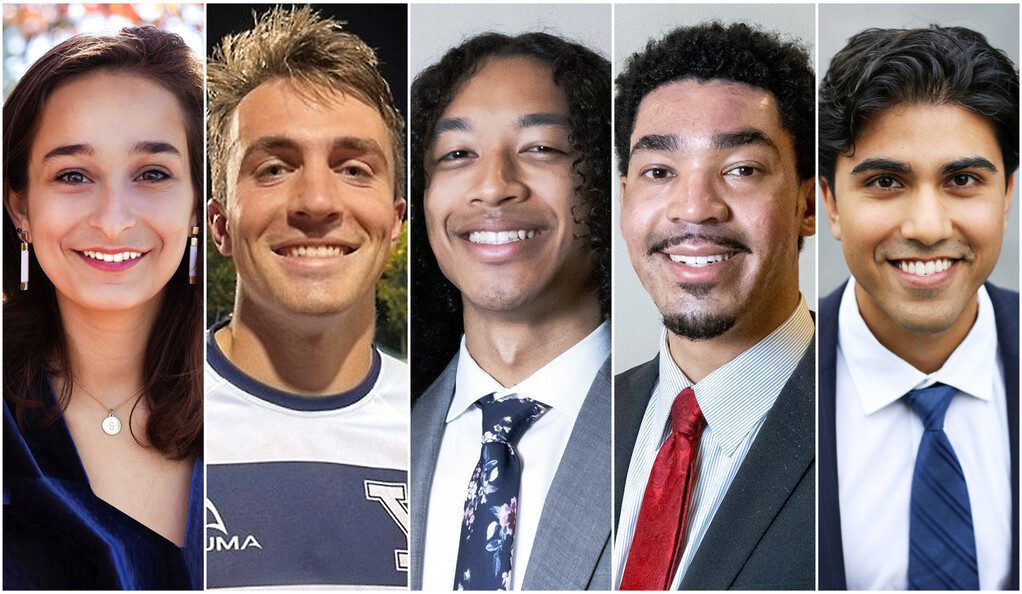Yale boasts most Rhodes Scholars in a decade
Five Yale seniors were announced as winners of the Rhodes Scholarship, a prestigious award granted to a total of 32 American undergraduate students that funds graduate study at the University of Oxford.

Yale News
Sophie Huttner ’23 waited painfully on a Zoom call for four hours on Saturday evening, sitting in her Silliman College dorm in anticipation of potentially life-changing news.
When she heard the final decision, she logged out, ran outside and cheered — then headed straight to dinner at Mory’s to celebrate. Huttner was named one of the United States’ 2023 Rhodes Scholars, joining a prestigious cohort of 32 students across the country. She is also one of five Yale winners this year, marking the most Yalies to receive the prestigious award in a single application cycle in a decade.
“I thought I had misheard the chair, and it didn’t sink in that they had actually said my name until the other finalists began logging off the call,” wrote Jonathan Oates ’23, another of Yale’s winners. “Honestly, it still doesn’t feel real.”
The Rhodes Scholarship is broadly considered one of the most prestigious graduate awards across the globe, funding two to three years of studies at the University of Oxford. This application cycle marked the third consecutive year in which candidates were chosen virtually. Huttner and Oates will join JT Mullins ’23, Veer Sangha ’23 and Henry Large ’23 at Oxford in the fall.
“As successful as the [virtual] process was, we of course hope to return to in-person interviews and selection next year in cities across the country, as had been done for over a century,” said American Secretary of the Rhodes Trust Elliot F. Gerson in a Sunday statement.
For the 2022 application cycle — from which winners will enroll in Oxford in 2023 — more than 2,500 students submitted initial applications to their college or university, and 840 received a school endorsement. Most of the 16 districts interview 14 or more finalists. Only 1.28 percent of total applicants received a Rhodes Scholarship.
According to Gerson’s statement, Rhodes Scholars are selected in a “two-stage process.” Applicants must first be endorsed by their university, and then apply to one of 16 U.S. regions based on their home state or the state of their school. Each district interviews its own set of finalists and then selects two winners, totaling at 32 scholars nationwide each year.
Director of Yale’s Office of Fellowship Programs Rebekah Westphal told the News that she begins advising prospective applicants to the Yale nomination about six months ahead of the first deadlines, which are in early August. Then, Yale’s process involves several nomination committees — including faculty, deans and staff — who interview every applicant. Yale’s nominees enter the Rhodes process in early October.
“Our office supports students in many ways: with application prep, figuring out who to ask for recommendations, degree selection, interview strategy, practice interviews etc,” Westphal wrote in an email to the News. “Applying for Rhodes is a long but rewarding process.”
Four of Yale’s winners have interest in politics-related academics. Huttner plans to pursue a master’s degree in refugee and forced migration studies at Oxford. While at Yale, she noted she has worked as an interpreter and a legal intern for immigrants. She hopes to ultimately work in refugee advocacy and help craft policy to better support asylum seekers.
Mullins intends to spend his first year at Oxford pursuing a master’s degree in criminology and criminal justice and to then tackle either a Master of Public Policy or a second Master of Science degree in comparative social policy during his second year.
For Large, the award will help him access new military opportunities, specifically in Latin America. He will complete a two-year degree in Latin American studies, which will make him eligible to become a foreign area officer in the region. In addition to his academic pursuits, Large told the News he also is excited to play rugby for the Oxford team.
Deviating from explicitly political areas of focus, Sangha intends to work toward a Doctor of Philosophy in health data science. Presently a computer science major at Yale, Sangha is interested in cardiovascular health disparities and ways to tie artificial intelligence into patient care.
“I’m excited, shocked, and incredibly humbled to have been elected,” Oates, who will pursue a degree in political theory, wrote. “All of the finalists in my district were absolutely amazing. I’m grateful to so many people who helped me along the way—my family, my recommendation letter writers, my friends, mentors, and professors who helped me prepare for the interview.”
Last year, four Yale students won the Rhodes scholarship.







